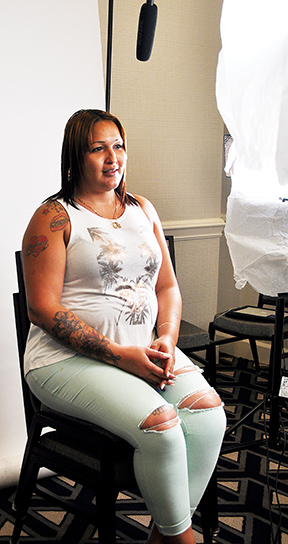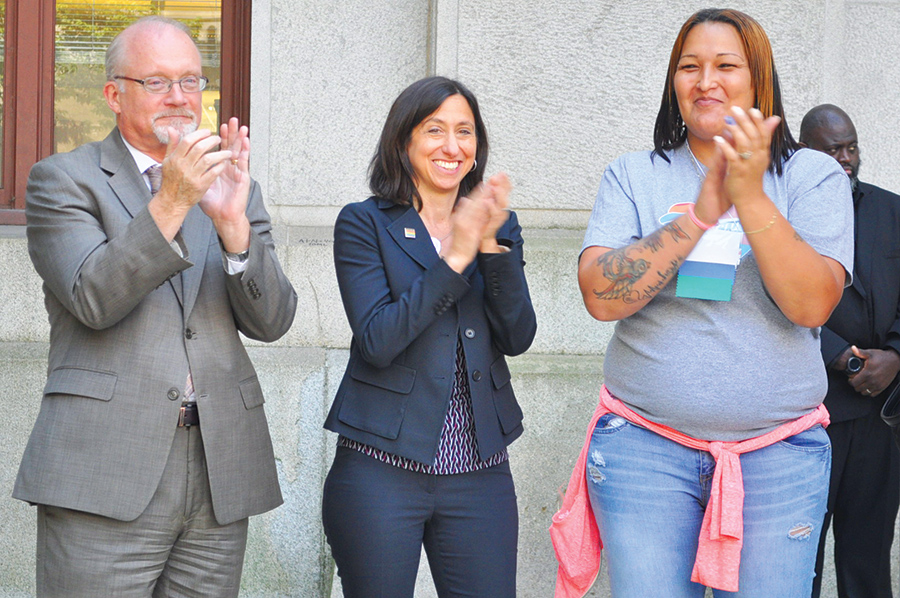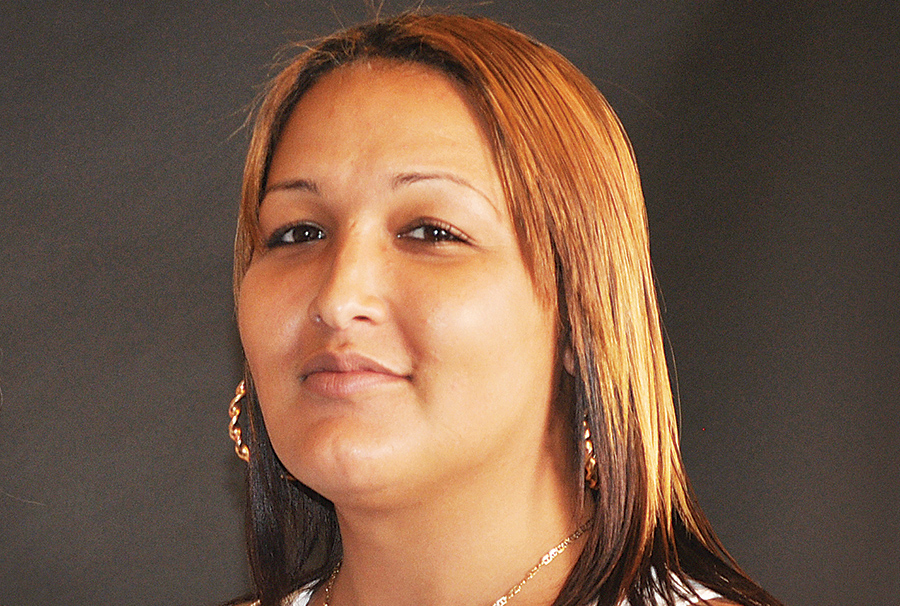Naiymah Sanchez interviewed five different trans-identified people in the Philadelphia Downtown Marriott’s Logan Room the morning of Sept. 8 for a video series. Through this initiative, the American Civil Liberties Union of Pennsylvania aims to publish a web page detailing the lives of trans people in the state.
Around noon, Sanchez switched roles and told her own story.
“My name is Naiymah Sanchez,” she said in front of the camera. “Pronouns are she/her/hers and the communities I identify with are the transgender community, the trans-feminine community and the Latinx community.”
Sanchez, who serves as the ACLU PA’s transgender-advocacy coordinator and community organizer, shared her experiences as an interviewer asked her questions. Her voice shook when she discussed more emotional topics — how her mother did not initially accept her, issues in school and getting fired as a cashier after her employer checked her Social Security number, which matched a man’s name.
One story she shared detailed her 18 months in a men’s prison, in which she was incarcerated after she defended herself.
“I was sexually assaulted in the prison by one of the persons paid to make sure everything is secure inside the facilities,” Sanchez said. “For nine months, being sexually assaulted by a correctional officer took a toll on me mentally and emotionally. That experience is one I will remember always and, once I was released, it was a reminder that I needed to walk a straight path so I don’t return to this environment.”
However, she noted that some trans people do not always have a “straight path.”
“We are not able to get jobs,” she said. “We’re not able to access safe education. So our life is set up for us to fail.”
Through this project, Sanchez aims to make sure other trans people do not “fail.” She walked with PGN from the Marriott to the Pennsylvania Convention Center, where the 16th Philadelphia Trans Health Conference was taking place. Her goal was to recruit conference attendees to tell their stories on camera.

“I think the [interview] questions are good because it captures our life, our stories and how our communities intersect,” Sanchez said. “It also lets people know we’re not just trans but we’re trans and we’re Muslim. We’re trans and we’re veterans. We’re trans and we’re disabled. We’re trans and we’re undocumented. We’re trans and we’re unapologetic.”
Though the state lacks an LGBT-nondiscrimination law, Sanchez hopes this series, with the full website expected to launch in early 2018, will “change minds.”
“We haven’t been able to accomplish this comprehensive nondiscrimination but I think when we have the stories of the community and you see the trauma in the eyes of the ones that are oppressed, it really gets people to think,” Sanchez said.
Sanchez also had a keynote speech to deliver that afternoon at the conference.
“It’s kind of hard for me because public speaking isn’t my best [strength], especially when it’s a large group,” Sanchez said.
With the way Sanchez carries herself, you would never think she was nervous, especially considering what happened to her the previous evening.
“You can put this on the record because this is a funny story,” Sanchez laughed.
After taking two weeks to write her speech, Sanchez read over it the previous day and noticed some things she wanted to change. When she started to make edits that night, she began to feel sleepy.
“I was so exhausted that I fell asleep on my iPad and it was erasing [my speech], and then the iPad died,” Sanchez said.
She ended up rewriting the speech around 1:30 a.m., noting it was still fresh in her head. Sanchez said she wanted to tie in the Trans Health Conference’s theme for the year: Perseverance. Strength. Power.
“When I was thinking about perseverance, I was thinking about our history and how we persevered through time,” Sanchez said. “It’s not just what we’re doing right now. It’s what led us up to today — when we are able to freely express who we are and feel more comfortable to come out as trans individuals. I really wanted to focus on our history of our community. And then it ties into the ‘strength’ and ‘power’ because if you look at how we persevered through riots, through direct discrimination, attacks from police officers back in the ’50s and ’60s to today —where I can walk up to an officer and say, ‘I need help. Can you help me?’ — it really helps me understand what my ancestors did. It gives me the strength to keep pushing on in the trans-rights movement.”
She pointed to the work of late local trans pioneers like Jaci Adams and Charlene Arcila, who she said empower her to make changes in the city.
“What keeps my fire burning is knowing folks have laid their life on the line and I should not take it for granted,” Sanchez said. “I should do the same. This is my obligation, as someone who is out and proud, to advocate for and educate our community.”

Part of Sanchez’s advocacy work involves constant networking. Several times while walking through the convention center, people would stop Sanchez to give her a hug, including friends and people she met at previous conferences, among them Creating Change; Sanchez co-chaired that conference when it came to Philadelphia in January. She said her attitude when speaking with conference attendees, whether she’s a main organizer or a general participant, remains the same.
“I like to engage the audience of the conference,” Sanchez said. “I don’t have to be an organizer to keep it friendly.”
Sanchez said people will sometimes “misinterpret” her friendliness and think she is an organizer. She recalled an experience from the previous day where a conference workshop presenter gave her surveys meant for the organizers.
“I took them to the help desk and they were like, ‘Why did they give it to you?’ And I’m like, ‘I dunno,’” Sanchez laughed.
However, Sanchez welcomes these interactions.
“When people just come up to me and ask me about things that are supposed to be happening at the conference, it makes me feel like I’m doing something that’s important and that I have done something to make them feel welcome,” she said.
Right before she delivered her speech, Sanchez sat down at a table to eat lunch. Between forkfuls of chicken and rice, Sanchez and a woman at the table struck up a conversation.
“Welcome to Philadelphia,” Sanchez told the woman. “Let me know if you need anything while you’re in the city.”
Since it initially seemed like Sanchez knew this person, PGN asked if this was a friend of hers. The answer was “no.”
“I don’t have to know her to talk to her. I think that’s a problem we have today. We feel like we have to — ” Sanchez paused to say hello to a passerby “ — know a person before we can initiate conversation. I get on the train and talk to anybody, just to talk.”
After lunch, it was time to deliver her keynote speech. As Sanchez stood in front of more than 100 people in Room 119AB, you would never guess public speaking was “hard,” as she’d previously claimed.
“Happy Friday — community, peers and allies,” Sanchez began. “Today, I stand in front of you as a proud transgender Latina who has overcome many obstacles in life.”
And that’s exactly what she did.

